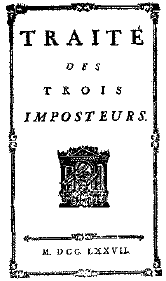Pamphlet
From The Art and Popular Culture Encyclopedia
|
"Marat! Le Peletier! […] sublime martyrs of liberty."--"Memorial Speech for Marat and Le Peletier" (1793) by Marquis de Sade "This pamphlet in its present form is the result of an inquiry into the characters represented in a historical grade of the Ancient Accepted Scottish Rite, and the probability of their having existed at the date mentioned in the said grade."--Treatise of the Three Impostors (1719) by anonymous |
|
Related e |
|
Featured: |
A pamphlet is an unbound small book or even a single sheet of paper. Pamphlets have long been an important tool of political protest and political campaigning for similar reasons.
A pamphleteer is a historical term for someone who creates or distributes pamphlets: for example in order to get people to vote for their favourite politician or to articulate a particular political ideology.
Today a pamphleteer might communicate his missives by way of weblog, but before the advent of telecommunications, those with access to a printing press and a supply of paper used the pamphlet as a means of mass communications outside of newspapers or full-fledged books.
Etymology
The adverb pamphlet for a small work (opuscule) issued by itself without covers came into Middle English ca 1387 as pamphilet or panflet, generalized from a twelfth-century amatory comic poem with a old flavor, Pamphilus, seu de Amore ("Pamphilus: or, Concerning Love"), written in Latin. Pamphilus's name was derived from Greek, meaning "friend of everyone". The poem was popular and widely copied and circulated on its own, forming a slim codex.
Its modern connotations of a tract concerning a contemporary issue was a product of the heated arguments leading to the English Civil War; this sense appeared in 1642. In some European languages other than English, this secondary connotation, of a disputaceous tract, has come to the fore: In German, French, and Italian pamphlet often has negative connotations of slanderous libel or religious propaganda; idiomatic neutral translations of English pamphlet include "Flugblatt" and "Broschüre" in German and "Fascicule" in French. In Russian and Romanian, the word "памфлет" in Russian Cyrillic, "pamflet" in Romanian also normally connotes a work of propaganda or satire, so it is best translated as "brochure" ("брошюра" in Russian, broşură in Romanian). compare libelle, from the Latin libellus, denoting a "little book".
In Spanish, panfleto is a brief written or libel generally aggressive or defamatory. By extension it is used for political propaganda written. Not to be confused with the term English pamphlet, from which derives, as it does not contain the negative connotations of the Spanish and translated more correctly as folleto.
Pamphlets can contain anything from information on kitchen appliances to medical information and religious treatises. Pamphlets are very important in marketing as they are cheap to produce and can be distributed easily to customers. Pamphlets have also long been an important tool of political protest and political campaigning for similar reasons.
See also
- Anonymity in publishing
- Counterculture
- manuscript
- Tract (literature)
- Hack writer
- Pamphlet wars
- Underground literature
- The pen is mightier than the sword
- Rants and Incendiary Tracts (1989) by Bob Black and Adam Parfrey
Examples


